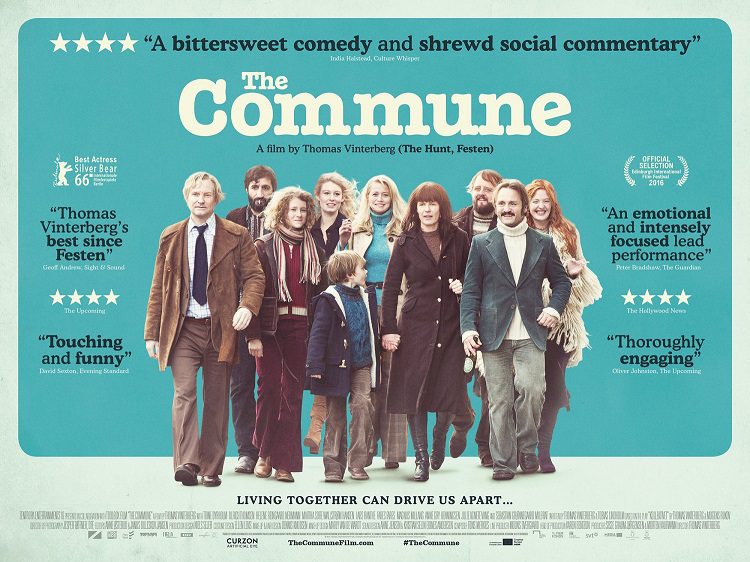
The Commune is a film that should be praised for its realistic depictions of a relationship growing stale and the difficulties of living with life-long friends and/or total strangers. I can imagine quite a few people will find some relation to this film in one way or another; I certainly did. But, at the same time, I also found myself wanting to be with characters that had more to them. For a good portion of the movie, I felt like I was watching something in which the script was written, but there were some glaring moments that felt like they were ideas that started and never got looked at again. Or they were ideas that started, maybe had a little bit of progression, and then never got finished.
Danish director Thomas Vinterberg based the ’70s-era film off his own experience of growing up in a commune in Denmark. He brings together an eccentric bunch of characters, all of them from different backgrounds, and places them under one roof. If you expect some kind of slapstick hijinks will ensue, you’d be wrong. Though Vinterberg doesn’t shy away from the quirkiness of those involved, The Commune also aims to cut a little deeper with its story.
It initially starts off with a couple whose marriage has been crumbling. There’s Erik (Ulrich Thomsen), an architecture professor at a nearby university, and Anna (Trine Dyrholm), a famous television news anchor. After his father passes away, Erik discovers that he has now inherited his childhood home, which is far too expensive for him and his family. But his wife, long upset at the kind of person Erik has become, decides that she wants a change in her life, and wants Erik to keep the house. After much debate, he decides to hang onto the house for her sake.
However, it’s still too expensive for the two of them and their daughter Freja (Martha Sofie Wallstrøm Hansen). So, Anna, wanting a change in their dull life, decides it would be a great idea to turn their house into a commune for their friends and maybe they can bring in strangers that will later become friends. Erik, of course, hates the idea at first, but then gives into it, and thus begins their new life.
Soon, the house becomes packed with a bunch of people. They’re people in which you kind of have an interest in getting to know. There’s Allon (Fares Fares), a man who works odd jobs and always breaks down when worrying about money. There’s Mona (Julie Agnete Vang), a free-spirit hippie that cries when she hears about a tree that might get chopped down. And there’s Vilads (Sebastian Grønnegaard Milbrat), a six-year-old boy with a heart condition that uses his illness as a way to woo women older than he is by saying he’ll die before he’s nine, and he asks if they want to “shag” with him.
There are more than just those three characters that move into the commune, but the reason why I bring them up is because they are examples of how one-dimensional some of the new tenants are in the movie. Milbrat’s character, especially, feels like he’s placed there for easy laughs and tear-jerking moments, though none of his scenes are particularly funny or sad. He’s just a crutch for manipulation, and it doesn’t play out well for The Commune.
There’s a moment where two of the new tenants share a kiss, and nothing is shown or discussed beyond that. It’s just one of the many things that is touched upon but never developed. Sure, Vinterberg wants you to see how the group is bonding after they go skinny dipping while The Who’s “Join Together” makes it clear that they’re getting to know each other and very well. But he doesn’t balance the connection to the new tenants and the crumbling relationship between Erik and Anna very well. The latter story becomes the more dominant here.
When Erik starts having an affair with one of his graduate students (Helene Reingaard Neumann), Anna becomes devastated. She has to determine how she wants her life to be now, and her idea of living with new people is starting to become a decision she wish she hadn’t made. Tensions flare, and soon, Anna’s life begins to steer out of control.
Dyrholm is the main driving force behind The Commune. Watching her break down before going to a live shot is devastating material. She’s a woman who, for years, has had to keep a straight face when reporting whatever news is taking place. She’s loved and adored by many. But even she has trouble when it comes to dealing with her own personal issues, and her vulnerability begins to show.
There’s certainly some good material within The Commune. Dyrholm may be the show-stealer, but Thomsen, Neumann, and Hansen are particularly great, too. Vinterberg can capture moments of uncertainty, fear, and anger really well, when it comes to having roommates and when a relationship that was once great starts to go south. But a lot of the film is also played too safe and tries to hammer it into you when certain emotions are supposed to be felt. One example is “Goodbye Yellow Brick Road” playing when tragedy strikes. It’s painfully obvious that Vinterberg wants the viewer to feel what the characters are feeling in the moment. Sadly, when you give little to the supporting characters involved, and use a song like that to get your point across, the scene doesn’t work.